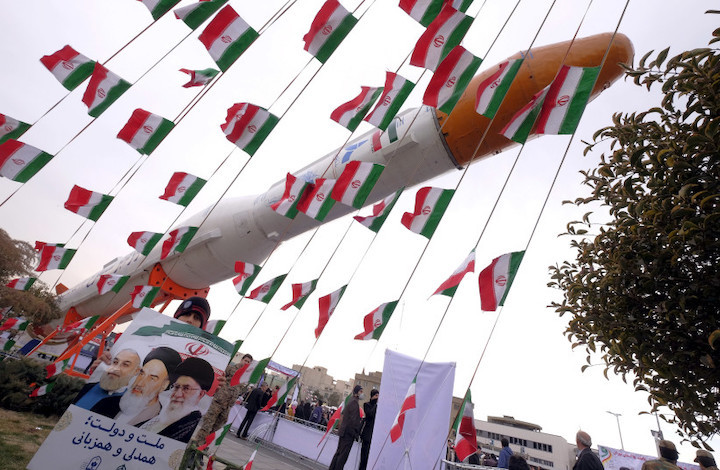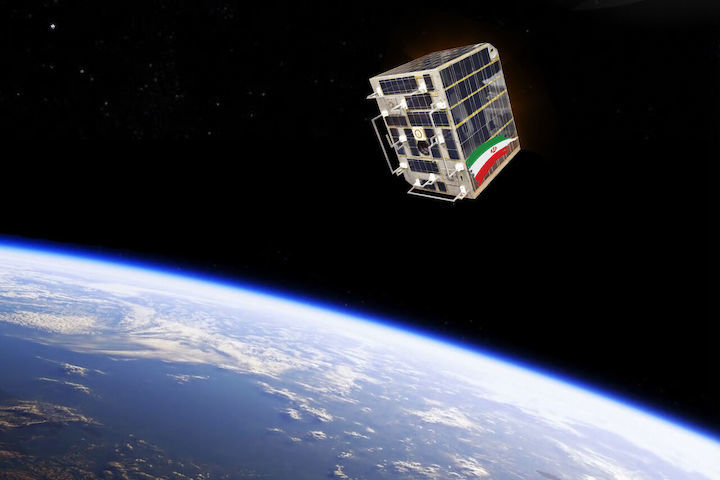Mohammad-Javad Azari-Jahromi made the remarks through a twitter message on the threshold of putting Zafar 1 and 2 satellites into orbit in coming days.
Speed of production has accelerated, so the speed of sending satellites into orbit should get faster, Azari-Jahromi wrote.
He then asked people to select a name for a geometric satellite with one-meter precision to start being built by Amir Kabir University scholars as of today.
Further, he described such a move as unique.
On January 19, the ICT minister tweeted that Zafar 1 and 2 Satellites have successfully been tested and will be put into orbit soon.
Zafar carries S&F consignment which provides features such as broadcasting a single message to all users, establishing one-way voice communication between two users, and sending a message to 256 direct users.
Quelle: IRNA
----
Update: 4.02.2020
.
Iran preparing to launch satellite in 'coming days'
Two versions of the satellite have been produced, in case the first launch fails.

Iran is preparing to launch a new scientific observation satellite in the "coming days," according to AFP.
Development of the "Zafar" (Victory) satellite began three years ago, said Morteza Barari, head of the country's national space agency, on Saturday. The 113-kilogram satellite will be launched by a Simorgh rocket.
Iranian Minister of Information and Communications Technology Mohammad Javad Azari Jahromi said that the satellite will be launched before February 11, the anniversary of the Islamic Revolution, according to the Iranian Tasnim news agency.
Two versions of the satellite have been produced, in case the first launch fails. Information about the satellite will be "clearly publicized," according to Jahromi. Zafar will be used for telecommunications, imagery and "picking up space signals." The lifespan of the satellite is one year and six months.
The primary mission of the satellite will be collecting imagery, according to Barari. Iran's satellite program is for the "peaceful use of outer space. All our activities in the domain of outer space are transparent," said Barari, according to AFP.
The Iranian Space Agency (ISA) hoped to construct five more satellites by March 2021.
The spokesman for the Iranian Defense Ministry’s Space Group announced on Monday that Iran is planning on revealing two new domestically made satellite carriers in "the near future," according to Tasnim. The statements came shortly before Iran confirmed that it would be launching a satellite soon.
The Islamic Republic is attempting to build solid-fuel satellite carriers and will reveal the "Sarir" and "Soroush" soon, according to the spokesman.
Iran launched its first satellite "Omid" (Hope) into orbit in February 2009, according to the Iranian Fars news agency. A second satellite, "Rasad" (Observation), was launched in June 2011. A third, "Navid" (Promise), launched in February 2012.
Development of the "Payam 2" telecommunications satellite will begin by late May, according to Barari. Building the satellite will take up to four years. In January of last year, a satellite named Payam was launched by Iran, but failed to reach the "necessary speed" in the third stage of its launch due to technical problems, according to Fars.
Barari told Fars on Saturday that Iran is among the top five countries with a space station and among the top nine countries in the field of designing and making satellites. Iran will launch four more satellites into orbit between March 2020 and March 2021, according to Barari. "These will include two satellites for measurement and imaging and two others for IT purposes," said Barari.
Iran is also planning on sending astronauts to space with an "advanced country," said Barari to Fars.
"The talks are underway, and we hope to reach an agreement with one of the countries to commence the project," said Barari, who declined to name the country with which the ISA is speaking.
"With the cooperation of this country, we are aiming to send a scientist-astronaut instead of a space tourist. Our goal is to participate in international projects; that is, to have an Iranian scientist present in the Earth's orbit or a space station to take part in international research projects," said Barari.
Iran's space aspirations suffered from three
failed satellite launches in 2019: one in January, another in February and a third in August. The United States has warned Iran against rocket launches, fearing the technology used to put satellites into orbit could help it develop the ballistic missile capability needed to launch nuclear warheads, though Tehran denies its activity is a cover for such development.
Quelle: The Jerusalem Post


